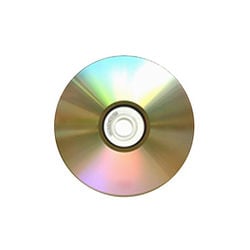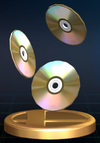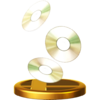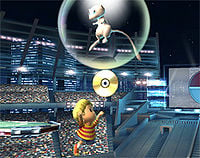CD
- For the American smasher, see Smasher:CD. For the Taiwanese smasher, see Smasher:CD (Taiwan).
| CD | |
|---|---|
  A CD | |
| Appears in | Brawl SSB4 |
| Item class | Collectible |
| Requirements | Mew from Poké Ball in Brawl and for Wii U, Challenges, Randomly (in solo or multiplayer mode if items are on) |
| Article on Wikipedia | Compact disc |
CDs are collectable items in Super Smash Bros. Brawl and Super Smash Bros. for Wii U, in the same vein as trophies and stickers. Collecting a CD will unlock a new track for My Music. Both Brawl and for Wii U also have a CD trophy. The CDs in Smash look just like real world CDs.
Like trophies, certain Challenges may need to be beaten to unlock specific tracks. There are 133 CDs in Brawl, including 31 which are available only via Challenges. CDs do not return in Ultimate, and have been replaced with the alternative method of buying music tracks from the shop. Some music tracks are still available as rewards for certain challenges, but they are not presented as a CD.
In Super Smash Bros. Brawl[edit]
Like stickers, CDs will appear in all game modes, and the chance of appearing can not be altered via the item switch. However, the frequency with which CDs appear is far lower than that of stickers and, unlike other items, CDs will only appear for a few seconds before disappearing, disappearing even faster than the Barrel Cannon in Melee. When it is grabbed, an orchestra-like sound will be heard and the screen will flash in a light green color. It can get extremely difficult to collect CDs on larger stages due to their speed of disappearance. According to the CD trophy, once all tracks have been acquired, CDs will stop appearing; CDs may still appear during a Wi-Fi battle if at least one player doesn't have all the CDs. The game won't stop players who have all CDs from collecting it.
When a CD is collected, the player(s) will be alerted to what track it contains and be able to listen to it after the match, unless it is collected during Wi-Fi play, then the alert will come some time after the player logs off. If a CD is collected when playing in Classic or All-Star Mode, and the Wii is turned off during a match, the player(s) will be alerted the next time the game is started. Collecting CDs in The Subspace Emissary will alert the player once the mode is quit.
CPU players will never attempt to grab a CD. However, if they do so accidentally by trying to attack or air-dodge while nearby, the corresponding track will not be unlocked.
In Brawl, some players have created CD Factories, special custom stages for farming CDs by use of the Sandbag item.
Trophy[edit]

- CD
- Each stage in Super Smash Bros. Brawl has several songs prepared for it. You can set the percentage chances for which songs appear in My Music. It's fun to choose songs according to your tastes. Each CD contains one song to increase your music library. Be sure to grab them when you see them. Once you've got all the music that's in the game, CDs will stop appearing.
: Super Smash Bros. Brawl
In Super Smash Bros. for Nintendo 3DS[edit]
CDs are no longer collectible items in Super Smash Bros. for Nintendo 3DS. However, they can still be prizes given in Challenges, and acquiring a downloadable stage results in unlocking the CDs of said stage's music.
In Super Smash Bros. for Wii U[edit]
CDs return in Super Smash Bros. for Wii U. They function the same as in Brawl, but are no longer dropped by Sandbag, precluding the use of CD Factories.
Figure Players picking up CDs count towards the player's total, unlike regular CPU players, but they won’t deliberately attempt to grab one.
CDs no longer appeared online, possibly due to CDs getting stolen by players who already have all the songs in the game.
Random CDs can be earned as rewards for completing tickets in Special Orders.
Trophy[edit]

- CD
These elusive items are no good to you at all during battle, but picking one up adds a new song to your growing music collection. You can then give it a listen in Sounds and use My Music to set how often you'll hear it in battles. Yes, it IS a shame you can't also throw the CD at a foe, but not everything in life is for throwing at people.
: Super Smash Bros. Brawl (03/2008)
: Super Smash Bros. for Wii U
These elusive items are no good to you in battles, but picking one up adds a new song to your growing music collection. You can then give it a listen in Sound Test and go to My Music in Options to set how often you'll hear it in battles. Yes, it IS a shame you can't also throw the CD at a foe, but not everything in life is for throwing at people.
: Super Smash Bros. Brawl (06/2008)
: Super Smash Bros. for Wii U
Origin[edit]
The compact disc is an optical disc format developed by Philips and Sony and officially released in 1982. The CD was designed to improve upon systematic shortcomings of competing formats like vinyl records, cassette tapes, and LaserDisc, and would grow to become one of the most popular formats over the next several decades. Among other advantages, the CD's use of digital audio playback removed issues of generation loss and surface noise that were inherent to analog formats, and the fact that it was read by a laser reflected off of a metal layer within the disc meant that it did not erode from playback (as records and magnetic tape are read by physically rubbing them against a crystal stylus and an electromagnet, respectively). The large data capacity of the discs relative to their size also made them cheap to produce and allowed for greater amounts of audio, video, and/or software to be distributed at once. However, although it was resistant to light scratches and smudges, a disadvantage of the CD is that heavier wear and tear could render areas of the disc unreadable unless it was cleaned or resurfaced, and extreme mishandling could result in CD rot, a process by which the metal layer becomes exposed and oxidizes away, rendering the affected parts of the disc permanently unreadable.
CDs were the dominant format for music from the late 1980s to the early 2000s, when they were supplanted by digital distribution (though they remain widespread in Japan and continental Europe). They were also a popular means of distributing video games and computer software from the 1990s to the 2000s, after which they were supplanted by higher-capacity optical discs like the digital video disc (DVD) and the Blu-Ray, solid state media, and digital distribution. Because Nintendo eschewed industry standard optical disc formats for their video game consoles, real world usage of CDs for the Super Smash Bros. series is limited to soundtrack albums.
Trivia[edit]
- If Mew appears from the Poké Ball item, it will drop a CD upon disappearing. If all CDs are collected, it will drop a random sticker in Brawl, and a random Trophy or Custom Part in Super Smash Bros. for Wii U.
See also[edit]
| Items in Super Smash Bros. Brawl | |
|---|---|
| Normal | Assist Trophy · Banana Peel · Beam Sword · Blast Box · Bob-omb · Bumper · Bunny Hood · Cracker Launcher · Deku Nut · Dragoon · Fan · Fire Flower · Food · Franklin Badge · Freezie · Golden Hammer · Gooey Bomb · Green Shell · Hammer · Heart Container · Home-Run Bat · Hothead · Lightning Bolt · Lip's Stick · Maxim Tomato · Metal Box · Motion-Sensor Bomb · Mr. Saturn · Pitfall · Poison Mushroom · Poké Ball · Ray Gun · Screw Attack · Smart Bomb · Smash Ball · Smoke Ball · Soccer Ball · Spring · Star Rod · Starman · Super Mushroom · Super Scope · Superspicy Curry · Team Healer · Timer · Unira · Warp Star |
| Containers | Barrel · Capsule · Crate · Party Ball · Sandbag · Rolling Crates |
| The Subspace Emissary |
Key · Stock Ball · Trophy Stand |
| Collectibles | CD · Coins · Sticker · Trophy |
| Other | Smash Coins and Bills |
